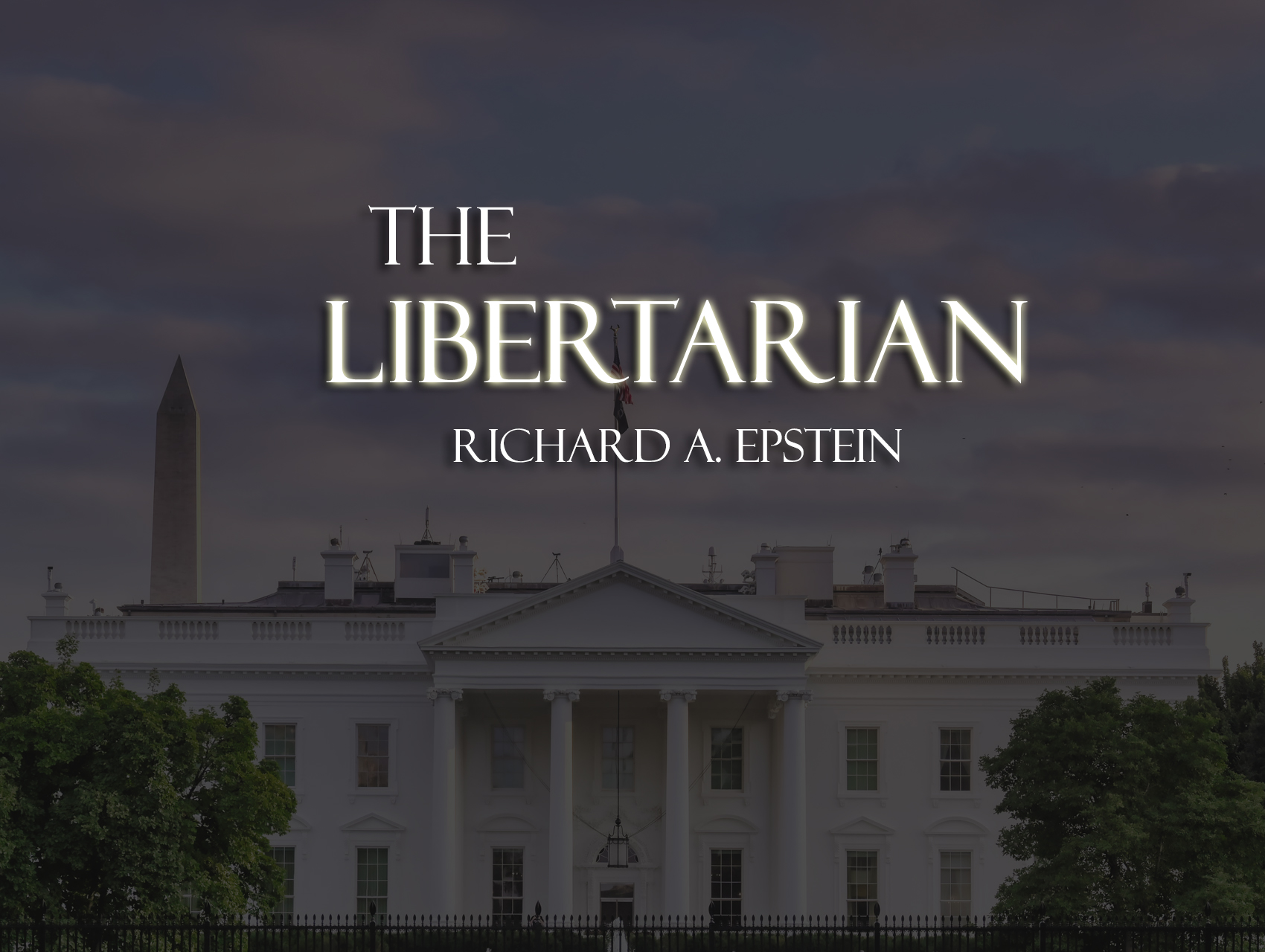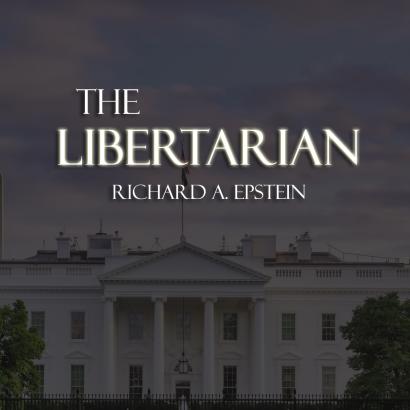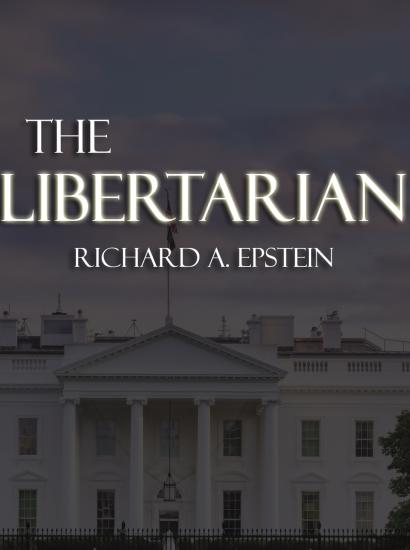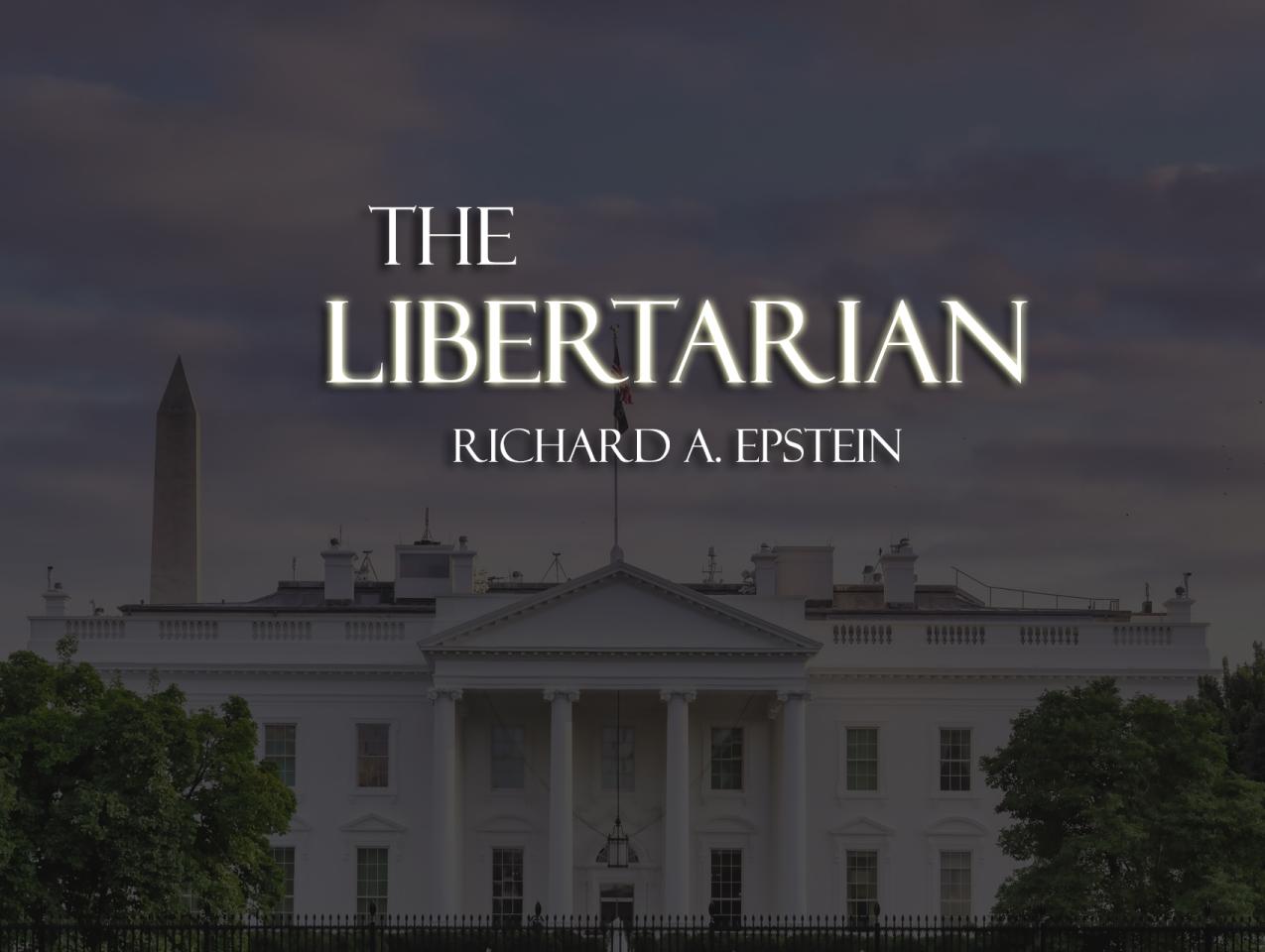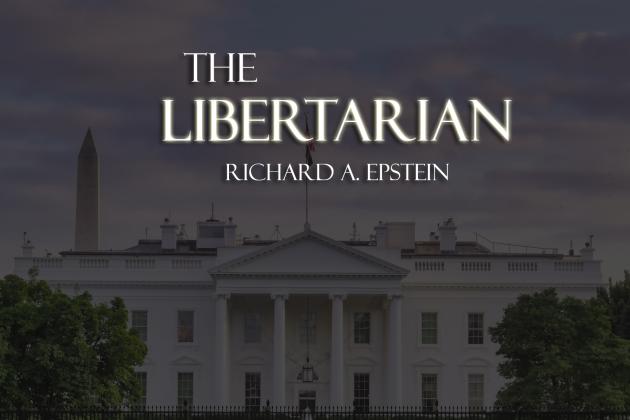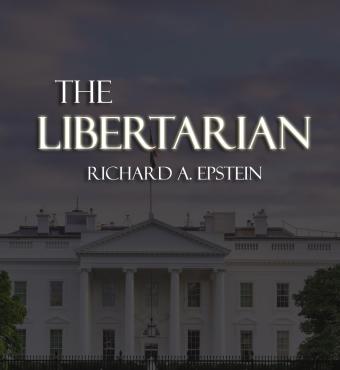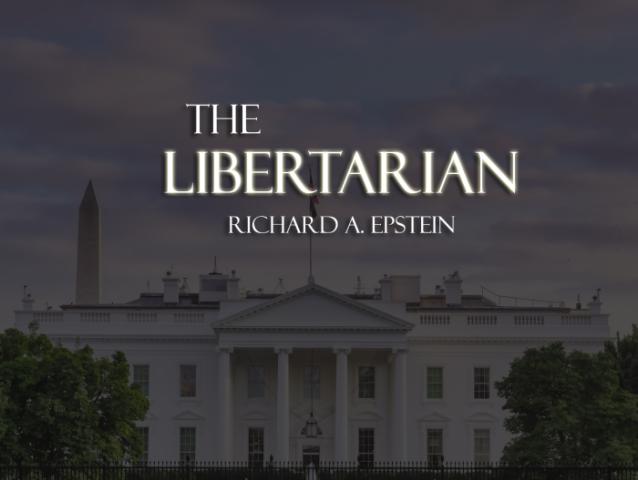Richard Epstein discusses Colorado’s Supreme Court arguments for removing Trump from the ballot and then analyzes potential 25th Amendment concerns brought about by a special prosecutor’s analysis of President Biden’s mental competency.
>> Tom Church: This is the Libertarian podcast from the Hoover Institution. I am your host, Tom Church, and I'm joined, as always, by the libertarian professor, Richard Epstein. Here at Hoover, Richard is a Peter and Kirsten Bedford senior fellow. He's also the Lawrence A Tisch professor of law at NYU, and he's a senior lecturer at the University of Chicago.
Now, Richard, there's lots to talk about this week involving former presidents, current president's mental acuity, viability for office in general. I think we'll start with the Supreme Court arguments yesterday made regarding Colorado's attempt to kick former President Trump off the ballot. I'll just say that I think the justices were skeptical of the arguments being made.
And clearly, I'd love to get your read on this, of course, I'd love your prediction. I always want to get you on the record what your prediction is going to be and what lines of argument do you think. Was there anything on the Colorado side that you thought, okay, this is actually a decent point?
>> Richard Epstein: Look, I'm gonna stop at the end. I think the vote will be 9-0, and I think the ball will be 9-0 because they will fasten in on an argument which is not today played a prominent role in the debate, which has gotten larger as things gone on.
Section five of the 14th Amendment says Congress shall have the power to enforce this by appropriate legislation. And the argument that seems to command everybody's respect is that if you do not have Congress as the taskmaster on this particular charge, 50 states can go in 50 ways, having 50 different standards by 50 different people.
And as the incredulous justice says, this is a federal legislation after all. And indeed, if you take the Colorado argument, you don't even need section three to keep them off the ballot. Colorado now decides that a man with an immoral past is not fit to run president of the United States, so we're gonna kick him off.
There is essentially a general provision which says that the only requirements becoming president of the United states, apart from being elected, are that you have to be a citizen, you have to be 35 years of age. And in the term limits case, the Supreme Court justice has said you can't add any additional requirements onto that, like, for example, the disclosure of your tax returns, in order to get on the ballot.
So you look at this case and you ask yourself, how can the state of Colorado decide that it's going to throw him off because they believe he was part of an insurrection. Well, this is not a self-defining term, insurrection, and it's clear that they could use one definition, another state could use another definition.
So, the federal element essentially completely devolved, as Justice Roberts says. A nice point is, we all thought that the 14th Amendment was designed to place additional limitations on the way in which states could behave. And now what you're saying is, it affects a single state, can knock somebody off the ballot, and that might be the difference between winning and losing the election.
So, the easy thing for everybody to say is that there's no congressional authorization for doing anything here. The cats are not allowed to do whatever they want out there in the field. And so unless they get congressional authority as a minimum condition, nothing goes. They don't address, nor do they have to address.
In this case. The question is just how can the Congress decide to authorize, in an authorization provision, could they give a definition of an insurrection which is so broad that everybody qualifies as an insurrectionist, or so novel narrow that nobody can? I think the answer to the question is no.
That if Congress does authorize, it can only give a definition of insurrection which meets constitutional standards as defined by the courts, but that's a different thing. I don't think they're going to want to go into the other arguments, which I think are valid. I think the whole thing is just a complete farce, mainly the question of what's an officer of the United States?
And here we have a very interesting conflict between the natural meaning of the term office and officer. And the two of them sort of go together like ham and eggs. But if you look at the particular text of the constitution, it turns out that the officer is a defined term under the appointments clause.
It turns out that the president gets to appoint all officers. And the only way in which you can understand this provision sensibly is he doesn't get to appoint himself. So therefore, an officer has to be at appointive office to the United States to make sense of the appointments clause, and it turns out that the president doesn't.
If you then tie that into the structure of the 14th Amendment, the ability to waive these insurrectionist requirements was given to both houses of Congress. But the president, of course, doesn't get appointed. So that's useless. And the only remedy therefore that you have the half test to go somewhere else.
My view is it's conclusive evidence that you can't have the president subject to this. And the other explanation is, when you look at the introductory clause, it talks about senators, representatives, and presidential electors, and vice-presidential electors. Why are they on there? Because what happens is these are all chosen by states.
And if they choose a bunch of electors who are insurrectionists, it can obviously screw up the elections after the 1868. So, what they wanted to do is to make sure that all those guys were purged. If they're purged, then there's no reason why the electoral college cannot do its general work, which is why they don't put the president on the list.
All this seems to me to make perfectly good sense. All of this sort of came out in the argument one way or another. And what happened is it's just a lot of hot air, essentially based on the indignation of January 6 as an effort to cavort this thing over the boundary line.
And back of it all lies the following issue. You want to talk about insurrection, you have a court in Colorado deciding the president can't be on the ballot. And now they're gonna be 80 million people, at least in the United States are gonna be absolutely outraged at this anti-democratic move.
And the only thing you have to say for what's going on is these highly tenuous speculations, which make no dissents, are going to control the case. So, that's why it is that Jonathan Mitchell, who I'm proud to say was one of my students, research assistants, one of the ablest lawyers I've ever taught in my entire life, why he did such a bang-up job on this thing.
I just do not believe that anybody who takes this thing seriously can believe that this particular move is appropriate. It is the most anti democratic, the most dangerous kind of move that you could have. And the point about this is the Supreme Court has to end it now.
And the argument that I gave is the one that can get everybody to sign on. They should sign on to that argument, they should ignore everything else, and they should write a two page opinion. Because we don't want them going into all sorts of stuff where it's gonna be a lot of controversy and a lot of debate.
This is an ice cold, deadly situation. It was one of the last things that we all thought about at the beginning. But it turns out to be the easiest way to preserve. What I think you really need is a nine nothing victory and a nine nothing victory that gets the court out of this mess and puts it squarely back in the lap of Congress where it belongs.
>> Tom Church: Really quick follow up, Richard. So, let's say it comes back 9-0, they say he's allowed to be on here. Does that quash every other challenge in what I think 35 states or something that are out? I mean-
>> Richard Epstein: Absolutely.
>> Tom Church: it does, okay, so that's,
>> Richard Epstein: Because what happens is none of the other states can point to anything that Congress did which authorized them to take on their particular vendetta, and that's what they are.
I mean, this would have a very different valence to it if you had seen Republicans joining in on the attack. The reason why Richard Nixon went down in the impeachment cases is nobody in his own party wanted to stand up for him. And in this particular case, it's all left-wing democrats who are pushing the particular agenda.
Having minor elective officers that are supposed to give you this chilling power, and it just doesn't compute as a political situation. Look, I regard this as one of the most serious threats to the stability of the republic that we've ever seen. And this is not to say that, because I think that Trump may be elected, that I'm cheering cuz I'm rooting for him.
That's not what's going on here. I could care less who he was or what he was for the purposes of this motion. The other judgments are all political. And as far as I'm concerned, we all have to bide our time, sorry, using the word bide, as in Biden, our time on this stuff.
And there are lots of other things that we have to worry about before we make that kind of choice as a nation. But I think what the Supreme Court does is it wants to get this thing off the table right now in an emphatic way so it doesn't come back to bite us in October.
>> Tom Church: And eventually we're gonna come back and talk to the Supreme Court worried about the presidential immunity case. We're gonna do that at another time. And I think wait until we see what happens next week with the appeal. So let's move on, actually, to the current president that's Biden had a bad day yesterday.
The special counsel Robert Hur released a report exonerating the president of any wrongdoing in terms of handling sensitive and classified documents. Specifically called out the president's memory issues, concluding that a jury would find it difficult to convict President Biden, and I'll quote, of a serious felony that requires a mental state of willfulness.
Now, that is not great thing to hear about a current sitting president. This is, I will note on the heels of former President Trump confusing Biden and Obama several times about who is currently the president, as well as blaming the lack of capital security during the insurrection, as he called it, Nikki Haley instead of Nancy Pelosi.
So, Richard, I'm looking at multiple the major candidates for president who are clearly slipping in their old age. And I'd like to ask you, well, a handful of things. One that has come up is, I mean, we had this discussion about the 25th amendment with, at the time President Trump and democrats climbing for that, is the shoe on the other foot here?
Now, I mean, is this something that Democrats would want to start thinking about? Or something that you think republicans might start thinking about in terms of trying to get Biden off the ballot, what do you think?
>> Richard Epstein: I think it's even worse than you said. You said they exonerated him of any wrongdoing.
That's not what they said. In fact, they quoted cases in which he shared passages of confidential doctrine with his ghostwriters and other kinds of individuals, which is a flat no, no. What they said is, whether he committed this stuff or not, then there's very strong evidence that he did.
What's happened? He's not fit to stand trial. So the Trump people come back to say, if he's not fit to stand trial because he's incompetent, what makes him fit to become president of the United States? And when the New York Times above the fold starts to announce that this was a disastrous meeting, one of the ways that you can treat this as part of a subtle campaign which is going to grow in its intensity by all people who are on the democratic side of the line, saying, joe, we would love to give you a wonderful farewell party to thank you for all the wonderful contributions that you made, but you can't be our party candidate, because if you are bad now, it's only going to get worse as this thing goes on.
Look, within six months of the age of Mr Biden, if I were in that kind of sorry shape, I would have retired long ago, because there's absolutely nothing that he has going for him, given these constant goofs and these gaffes. And so what you're gonna do is see somebody like Woodrow Wilson at the end of his presidency, and Edith Head will now become Jill Biden.
And whatever her educational achievements, she's not competent to be president of the United States, even by proxy. So I think they're going to do it now. How do you do it? Well, this is one of the terrible things you have. If you look at the 25th amendment, it starts talking about how the vice president and the principal's officers, however define, have to sort of come together and go to the Congress by addressing both the speaker of the House and the president pro tem of the Senate to go on this thing.
Well, what it's doing is basically you've got Pam Kamala Harris, who's not very competent herself, in the very awkward position of having to decide whether or not to lead a coup as against the sitting president of the United States within seven or eight months of an election. I don't think she wants to do that.
I don't think anybody wants her to have to do this. It's too public a process which will distract us from everything. I think what you really want to do is to have a rather somber meeting in some quiet hotel in which the president is surrounded by his own advisors and by people who are independent of stature, and they all come up and say, joe, it's all gone.
You can't do this anymore. You just have to step down and go. We've had that happen with justices and so forth, or judges who have begun their prime. Former, my good friend and Richard Posner was forced off the bench in 2017 exactly for these kinds of reasons. It's happened with other judges in other cases, and I think what happens is they have to say it's time to go.
I would rather it be a bipartisan situation with Republicans whom he requests respects and so forth, to have this, but I don't think he should be allowed to run at this particular point in time. I cannot say that about Trump. Whatever his exorcisms are, is a consistent form of buffoonery that he's practiced a very long time.
And as far as I can see, I see no sign that he has lost his power. It's one of these things that is always true, and I see it in connection with myself and my colleagues. As you start to hit your eighties, some people keep going. I hope I'm one of those.
Many do not. So that I'm sitting down on a faculty where most of the people who are my age have long since retired and probably for the best. So it's very delicate. And if you're running in a major corporation, you never, ever let somebody remain a CEO past the age of 65 or 70.
It's just too risky. This presidency of the United States is at least as complicated as running General Motors. And so you have to force him out. And I'd rather you not do it by the formal procedures because I think that's going to be bloody, and then I hope they do it soon enough so the Democrats in a crisis mode, can decide whom they want to be their presidential nominee.
Is it gonna be Kamala? I think there's very little support for her. When she tried to run for president the first time, she couldn't even keep her house in order for the primary. And so I think it's gonna be some heavy hitters like Christine Whitman or Gavin Newsom City in California, who will try to make this kind of push.
It's going to be very chaotic. It turns out, you won't be able to do this through the primary system because Biden has simply held on too long. Remember Ruth Bader Ginsburg? She was an admirable judge in many ways for a very long time. But in the last three or four years of her life, it was obvious that she was failing and she wouldn't step aside.
And the Democrats today sort of remember her as being the stubborn old lady who wouldn't move. And so in the end, instead of getting a reliable Democrat for her seat, you got Amy Barrett, a rather different political confession. So I think they're gonna be a lot of pressures going.
One of the key operatives, I suspect will be Barack Obama. I don't think his wife is gonna run, but I think he has sufficient clout within the party that he might be willing to step up and help this thing. It's well known that he had very little respect for Obama when he, rather for, I'm getting that way too, Obama had very little respect for Biden when he was vice president.
It's gonna be very delicate, but I think essentially there has to be a very large delegation which tells them he can't go forward. This report is too damning. And the point about it that's so clear is when you see the New York Times calling. It's not unfortunate, but disastrous.
Right. You can't think of a better barometer for the Democratic Party than that paper. And if they're basically using that word to say that he's not electable and should not run, I think it should be regarded as an influence. A statement that everybody else ought to take and respect.
>> Tom Church: You know, Richard, this is looking back in history. It's not the only time, I suppose, that this, well, it hasn't happened yet, and I honestly don't think it will. I'll go on record and say I think this election is going to be between Biden and Trump. But back in 1968, LBJ announced on March 31 of election year that he wouldn't be running for reelection.
>> Richard Epstein: I know.
>> Tom Church: And so-
>> Richard Epstein: I watched it, my friend.
>> Tom Church: You watched it. I didn't. We don't need to worry about why that is, Richard.
>> Richard Epstein: We know why.
>> Tom Church: We know why. But, so what would this look like? I mean if President Biden goes along until that point and decides, okay, I'm actually not going to run for reelection.
While the primaries have already sort of happened? You know, this isn't the 60s smoke filled rooms anymore. Are we talking about just democratic caucus getting together in the summertime and deciding among all the state delegates who they're nominating? How is that going to work?
>> Richard Epstein: You ask the right questions.
Look, it turned out when Johnson did it, it was a lot easier. Because he had a very respectable vice president in Hubert Humphrey, who was kind of a folk here for large numbers of people. I don't remember the day, but I remember shortly after when it happened in 1948, when Hubert Humphrey went to the Philadelphia convention of the Democratic Party and essentially read the Riot Act on civil rights.
It was a raw act of courage when he did all that stuff. And the other person who was waiting in the wings at that time was Robert Kennedy. And there was Eugene McCarthy the moment that Johnson resigned McCarthy was toast. Because all the people who had supported him including myself for all sorts of complicated reasons.
I didn't like Johnson, but I thought that he was not capable of doing the job anymore because of his over involvement in the situation. He was in his sixties at the time. So this was all kind of mad. But at least you had Robert Kennedy and Hubert Humphrey, either of whom was eminently electable.
And there are only two of them at this particular point. Who is it that is going to step forward and claim that you can't use Kamala Harris as the vice president? She's just too weak and everybody knows that. The talk about her was, is there a way to get her off the ballot nicely by picking her upstairs and making her a representative to the UN or something?
They can't do that, I think, at this point. But if she runs, she will lose. And I think they all understand that. So I think it's a real mess. My view is he should have resigned a year ago. And this is not speaking as an anti Biden person, which I am.
I'm speaking as somebody who thinks that the most important and most difficult task in any political system is succession in office. And that's why inheritance is so difficult with respect to monarchies. And it's why the transitions between regimes is so difficult in democracies. And this is going to be a nightmare no matter what happens.
Because if Biden does stay on the ballot, I will be confident to predict he will not live to 86 in a position where he could any more work. So you're going to have to face it down the road anyhow. I mean, it's a national tragedy. You may think what you will about his previous works, but certainly when he was 30 years younger and so forth, much more astute.
You remember, this is the man who was a very clever political actor.
>> Tom Church: Yeah.
>> Richard Epstein: He took my book on takings and waved it above, somewhat frightened Clarence Thomas, saying, anybody believes anything in this book is not fit to have public office. So, I promise now that I won't run for president either.
And Thomas just looked at him and said, hey, you know, sir, we don't have to go into detailed constitutional exegesis. The words private property are in the constitution. And then Anita Hill came along and my 5 seconds of fame quickly dissipated. But that was a very different Biden back in 1991 than you have today.
And everybody said he was a cagey operator who understood how to put coalitions together and so forth. Nobody ever said that he was a great constitutional theorist. But if you're trying to talk about who's going to do better in politics, those people could put together viable coalitions or those people could spin out novel theories of constitutional law.
You'll take the form and leave the rest of us in the academy to do the latter.
>> Tom Church: Richard, I think that'll do it for us. Yeah, I think so. I think so. We'll have plenty to talk about in terms of presidential immunity coming up. Well, it's a-
>> Richard Epstein: Double Jeopardy, Double Jeopardy.
>> Tom Church: Double Jeopardy.
>> Richard Epstein: Stronger argument.
>> Tom Church: It's an election year. I don't know how, you know. I want to know, Richard, how excited are you that this is an election year compared to last year?
>> Richard Epstein: Well, I'm dreadful. I mean, you know, I do not see any. I think the United States has been in an evident state of decline, probably for a fairly long time, certainly since Biden was office.
I think Trump did better in terms of the geopolitical indicators than did Barack Obama. So that gets you back to 2008, and I don't see any viable path for improvement going forward. Ultimate difficulty is the fact of the primary system. When you had smoke filled rooms, you tried to get people who were savvy about all this stuff who moved to the center.
The primary is moving to the progressive left and to the reactionary right or some version of that. And so it's very, very difficult to come up with credible candidates through the stage one political process at stage two. And that's what is everything here. If there were a smoke filled room, I could assure you that Joe Biden would not be able to get the re-nomination, nor would Kamala Harris.
But we don't have that system now. We don't even have the primary system because he's not pulling out anytime soon. Super Tuesday is, what, three weeks away now? Maybe four weeks away. And that's going to mean that the delegates are going to be committed and they're going to be committed to a guy who can't run.
This is not what you really want to have happen to you. The United States is facing a major political crisis. Thank God the Supreme Court made it clear we're not going to compound all the difficulties that we can't avoid with Biden. And his age in the primary system by having people knock him off.
That is Trump off the ballot by using these rather insidious measures.
>> Tom Church: You've been listening to the Libertarian Podcast with Richard Epstein. As always, you can learn more if you head over to Richard's column, the Libertarian, which we publish on defining ideasoover.org. If you found our conversation thought provoking, please share it with your friends and rate the show on Apple podcasts, Spotify or wherever you're tuning in.
For Richard Epstein, I'm Tom Church. We'll talk to you next time.
>> Hoover Representative: This podcast is a production of the Hoover Institution, where we generate and promote ideas advancing freedom. For more information about our work, to hear more of our podcast or view our video content, please visit hoover.org.







